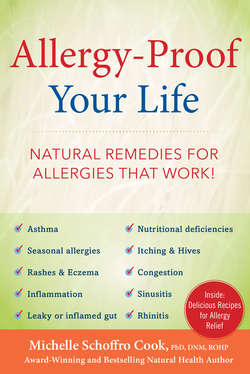Читать книгу Allergy-Proof Your Life - Michelle Schoffro Cook - Страница 22
На сайте Литреса книга снята с продажи.
OTHER ADDITIVES TO SUBTRACT FROM YOUR DIET
ОглавлениеThere are hundreds of additives in packaged, processed, and prepared foods—what I call the Three Ps. Many of these additives put a strain on the body and actually contribute to low-grade inflammation and other conditions linked to allergies. Some of the worst culprits include monosodium glutamate (MSG) and carrageenan.
MSG is linked to inflammation, hormonal imbalances, headaches, and many other symptoms. It is almost always found in processed, prepared, and packaged foods, including soups, spice mixtures, infant formulas, soy “meat” products, baby foods, bottled sauces, salad dressings, croutons, protein powders, and vaccines. Sadly, it is rarely listed as MSG or monosodium glutamate on the labels of foods. Instead, it appears in the guise of the following:
• hydrolyzed vegetable protein
• hydrolyzed protein
• hydrolyzed plant protein
• plant protein extract
• sodium caseinate
• calcium caseinate
• yeast extract
• textured vegetable protein
• autolyzed yeast
• hydrolyzed oat flour
Additionally, it frequently appears in the form of flavoring, natural flavoring, seasoning, or spices on the labels of food. Because it can be difficult to remember the myriad disguises of MSG, I tell my clients to avoid foods that include the following terms in the list of ingredients: hydrolyzed, isolate, caseinate, spices/seasonings, or flavors (natural or artificial).
You should also avoid the food additive known as carrageenan. It’s an additive that is so ubiquitous in the food industry that it is even found in most packaged foods and restaurant sauces, and even many foods that have been labeled “certified organic” contain the questionable ingredient. Although the additive starts out harmless enough (it comes from the seaweed known as Irish moss), it is then processed to extract the ingredient known as carrageenan, which acts as a thickener or emulsifier for many prepared foods. Once this ingredient has been extracted, it turns from an otherwise healthy food to one that causes widespread inflammation in the body.
Like most people, I originally thought that carrageenan was a harmless extract from seaweed, so I didn’t give it much consideration. Then while conducting my regular health and nutrition research, I read that scientists were giving animals carrageenan to induce inflammation as a way to prepare them for scientific studies exploring anti-inflammatory drugs. That was the first I’d heard of carrageenan being used in this way. So I began to investigate.
Dr. Joanne Tobacman has conducted many studies on the effects of carrageenan consumption, including a recent one in the Journal of Diabetes Research.17 After eating carrageenan for only six days, animals fed carrageenan developed glucose intolerance, which is an umbrella term used to describe impaired metabolism involving excessively high blood sugar levels. Dr. Tobacman found that the food additive caused blood sugar levels to skyrocket and indicates that it may lead to the development of diabetes. She indicates that because carrageenan used in animals’ diets commonly causes diabetes, the additive could be used for mouse models of the study of diabetes.
She also found that carrageenan causes intestinal and systemic inflammation in animal studies.18 Considering that inflammation is a well-established factor in most chronic diseases, including heart disease, diabetes, cancer, arthritis, pain disorders, and many others, any food additive in common use is a serious concern. Dr. Tobacman also indicates that the amount of carrageenan found in most peoples’ diets is sufficient to cause inflammation.19
Carrageenan is found in common foods, including infant formula, ice cream, cream, butter, soy milk, almond milk, rice milk, cottage cheese, sour cream, yogurt, coffee creamer, vegan cheese alternatives, egg nog, protein supplements, aloe vera gel, deli meat, juice, pudding, pizza, chocolate bars, coffee beverages, and many other packaged foods. Additionally, some supplements, particularly those involving gel caps, commonly contain carrageenan. And most grocery store rotisserie chickens typically contain the additive. Even many organic and certified organic foods contain carrageenan. To find out if the organic foods you use contain carrageenan that might not be listed on the label, check out the “Shopping Guide to Avoiding Organic Foods with Carrageenan” list compiled by the Cornucopia Institute at www.cornucopia.org.
In addition to MSG and carrageenan, be sure to avoid food containing artificial colors and preservatives. The preservatives known as sodium benzoate and potassium benzoate, once ingested, form a toxic chemical known as benzene in the presence of vitamin C. According to an interview with Peter Piper, a professor of molecular biology and biotechnology at the University of Sheffield in the United Kingdom, “These chemicals have the ability to cause severe damage to DNA in the mitochondria to the point that they totally inactivate it—they knock it out altogether.” Additionally, these preservatives have been linked to allergic conditions like hives and asthma, according to the Center for Science in the Public Interest.20
